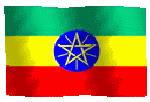Economic Reform
and Performance
Economic Structure
Economic Structure
The Ethiopian economy is dominated by agriculture which accounts for
about forty-five percent of the Gross Domestic Product (GDP), about
63 percent of total exports and 85 percent of employment. Coffee alone
accounts for over 62 percent of total agricultural exports.
Agriculture
Several crops are grown seasonally in different parts of the country.
The main crops are cereals (teff, barely, maize, wheat, sorghum, and
milliet), pulses (horse beans, vetch and lentils), and oil seeds (niger
seed, flax rape seed, sesame, castor beans and Soya beans). The main
cash and industrial crops are coffee, oil seeds, pulses, cotton, sisal,
tobacco, fruits and sugar cane.
Manufacturing
The manufacturing sector, which contributes about seven percent to GDP,
supplies important consumer goods both to the domestic and international
markets. The main manufactured products are textiles, foodstuffs, tobacco,
beverages, cement, leather, and leather products, wood, metallic and
non-metallic products, paper, plastic and tiles. The main manufactured
export products include clothing /apparel, leather & leather products,
canned and frozen meat, sugar and molasses, oil cakes and petroleum
products.
Mining
The mining sector currently contributes less than three percent of GDP.
According to the Ministry of Mines and Energy "Ethiopia's green
stone belts offer one of the finest prospects for gold mineralization
in the world. In addition to gold, Ethiopia is blessed with prospects
for tantalum, platinum, nickel, potash and soda ash and other minerals
such as marble, granite, limestone, clay, etc. With regard to fossil
energy resources, there are significant opportunities for oil and natural
gas in the four major sedimentary basins of the country, namely the
Ogaden, Gambella, the Blue Nile and southern Rift Valley.
Tourism
Ethiopia has the potential to be one of the leading tourist destinations
in Africa. It has many historical wonders, like the Rock-Hewn Churches
at Lalibela and ancient obelisks at Axum and is the home of endemic
species of wildlife and birds. The available tourism infrastructure
is, however, inadequate to serve the growing tourist traffic. Thus,
great opportunities exist for private investments in hotels, lodges,
etc.



